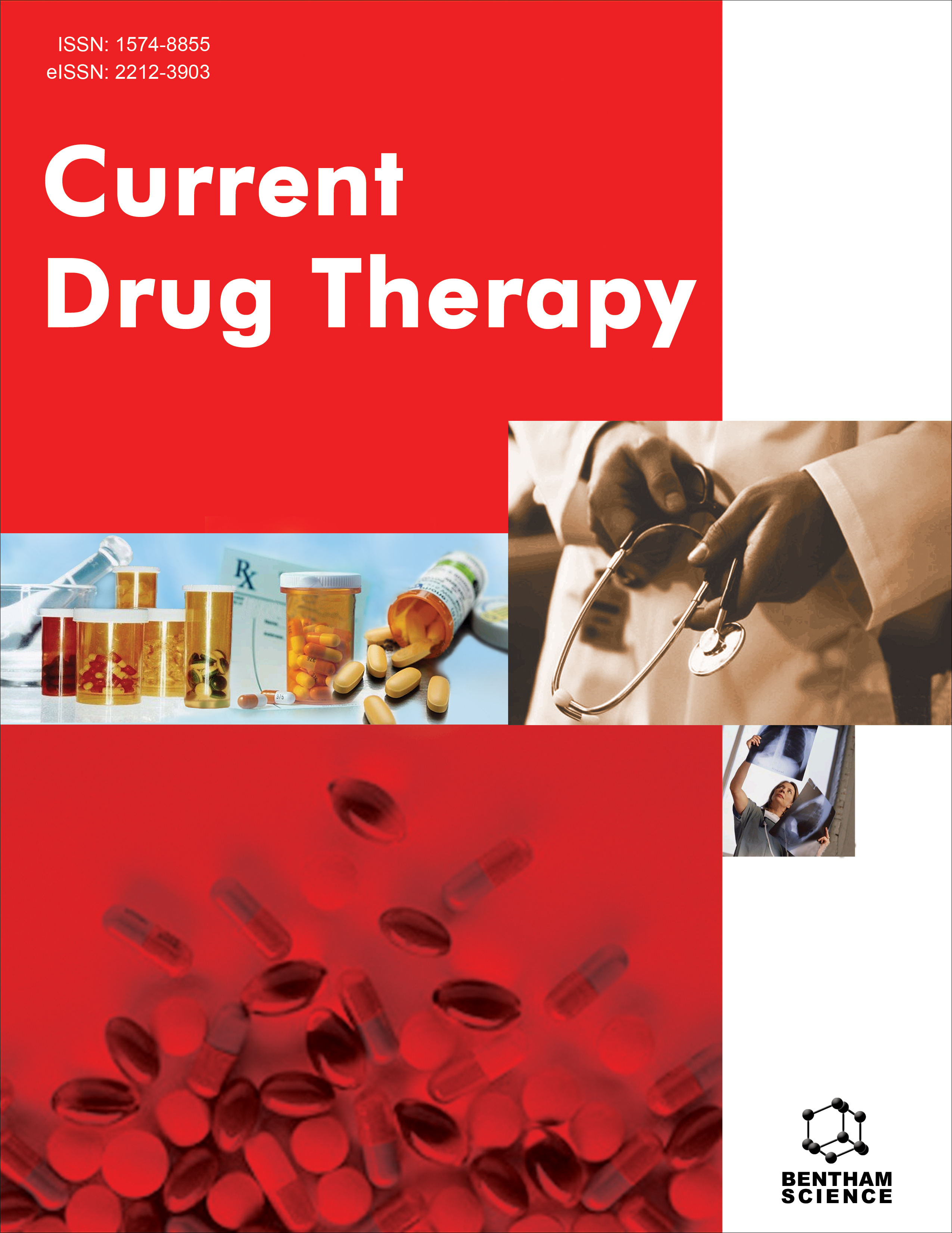- Home
- A-Z Publications
- Current Drug Therapy
- Previous Issues
- Volume 1, Issue 3, 2006
Current Drug Therapy - Volume 1, Issue 3, 2006
Volume 1, Issue 3, 2006
-
-
Effect of Antipsychotic Drugs on Cerebrovascular Morbidity and Mortality: A Systematic Review
More LessAuthors: Sara Mazzucco, Andrea Cipriani, Camilla Lintas and Corrado BarbuiBackground: Since 2002, there has been contrasting evidence indicating an increased risk of adverse cerebrovascular outcomes in people treated with the two most commonly prescribed atypical antipsychotics, risperidone and olanzapine. Objective: The objective of this systematic review is to examine the evidence of the correlation between antipsychotic drug use and the risk of cerebrovascular diseases. Method: We used the Read More
-
-
-
Antiplatelet Therapy and Oral Anticoagulation for Prevention of Ischemic Stroke
More LessAuthors: Christian Weimar and Hans-Christoph DienerPurpose of Review: To provide an update on stroke prevention strategies with oral anticoagulants (vitamin K antagonists) and platelet inhibitors. Recent Findings: In asymptomatic women, aspirin reduces the risk of stroke but not of myocardial infarction while in men only the risk of myocardial infarction but not stroke could be significantly reduced. No benefit of oral anticoagulants could be shown in patients with non-cardioemb Read More
-
-
-
Drug Targeting in Bronchial Asthma: Inhaled Corticosteroids Should Reach the Peripheral Airways
More LessBronchial asthma is characterised by an eosinophilic inflammatory process in the airways, and manifests itself functionally by bronchial hyperresponsiveness and variable airflow obstruction. In the past this inflammatory process was presumed to be predominantly present in the large and intermediate airways. This is not surprising since functional abnormalities in the small airways (or so-called silent zone) are mu Read More
-
-
-
An Increasing Incidence of Treatment Resistance in Hypertension?
More LessBy Ivar K. EideAccording to recent experience there is an unexpected high prevalence of treatment resistance in hypertension, i.e. an inefficiency of even complex treatment modalities, increasing the need for multi-drug regimens. Mostly, this applies to systolic hypertension which over the years was found to cause at least as much target organ damage as diastolic. In view of the high prevalence of hypertension, such resistance may Read More
-
-
-
Use of Topiceuticals (Topically Applied, Peripherally Acting Drugs) in the Treatment of Chronic Pain
More LessAuthors: Bradley S. Galer and Arnold R. GammaitoniDue to partial efficacy and adverse-event burdens, limited success has been achieved in the treatment of many chronic pain conditions with traditional, systemically administered analgesics such as nonsteroidal anti-inflammatory drugs (NSAIDs), COX-2 inhibitors, opioids, antidepressants, and anticonvulsants. Additionally, it is not uncommon for patients suffering from chronic pain to have complex medication regimens to t Read More
-
-
-
Topical Anesthetics for Procedural Pain in Children: What Does the Future Hold?
More LessMinor procedures are a major source of pain and anxiety for children. Topical anesthetics are one component of a systematic approach to procedural pain in children. Topical anesthetics are underutilized due to inconvenience, slow onset, cost and inconsistent efficacy. New topical anesthetic systems are available or under investigation which may reduce the barriers to topical anesthetic use. These include systems Read More
-
-
-
Multidrug-Resistance (MDR) Proteins Develops Refractory Epilepsy Phenotype:Clinical and Experimental Evidences
More LessEpilepsy affects approximately 3% of the population. Majority of epileptic patients may control their crisis with anticonvulsant drugs, however, 30%-40% became refractory to pharmacological therapies and could require surgical treatment. The causes of pharmacological refractoriness are poorly understood. Multidrug-resistance (MDR) mechanisms observed in cancer, could be also present in Refractory Epilepsy (RE). The A Read More
-
-
-
Colloidal and Pharmacological Activity of Albumin in Clinical Fluid Management:Recent Developments
More LessHuman albumin is extensively used and investigated in clinical fluid management. Whether albumin confers sufficient benefit to justify its cost has been a subject of enduring controversy. A 2003 systematic review assembled evidence of benefit, but uncertainty has persisted. Abundant additional data have been newly reported, and this review provides an update. Major recent developments include the largest ever singl Read More
-
Volumes & issues
-
Volume 20 (2025)
-
Volume 19 (2024)
-
Volume 18 (2023)
-
Volume 17 (2022)
-
Volume 16 (2021)
-
Volume 15 (2020)
-
Volume 14 (2019)
-
Volume 13 (2018)
-
Volume 12 (2017)
-
Volume 11 (2016)
-
Volume 10 (2015)
-
Volume 9 (2014)
-
Volume 8 (2013)
-
Volume 7 (2012)
-
Volume 6 (2011)
-
Volume 5 (2010)
-
Volume 4 (2009)
-
Volume 3 (2008)
-
Volume 2 (2007)
-
Volume 1 (2006)
Most Read This Month
Article
content/journals/cdth
Journal
10
5
false
en


